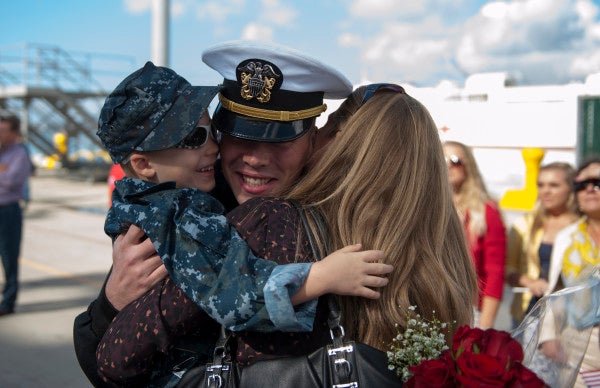Military Kids: Flexible And Well-Adjusted, Except When They’re Not
Maybe you’ve been at your new duty station for several months or your spouse has been deployed for a while....

Maybe you’ve been at your new duty station for several months or your spouse has been deployed for a while. You have followed all the suggestions friends and experts have given you:
Do your research. Make it into an adventure for the kids. Keep a positive attitude. Make the kids feel comfortable by decorating with familiar things.Take care of school registrations remotely and as soon as possible. Get them involved in familiar extracurricular activities. Keep the communication open with your deployed partner. Keep a journal and encourage your kids to do the same. Think of creative ways to help the kids make new connections.
You’ve done all this, yet you are dreading the question that a family member or well-meaning friend will inevitably ask: “So, how are the kids adjusting?”
Why? Because it’s less about the question and more about what your response will be.
You desperately want to be able to say, “The kids are great — they have jumped right in and are adjusting better than we are!” After all, military kids are flexible and well-adjusted. This sentiment is grounded in truth and has been perpetuated by the military community in an effort to praise and honor kids as they navigate the complex waters of the life they have been given. There have been poems, articles, and even books written about military kids. Artwork has been created; awards have been presented. Every April, we celebrate the resiliency of the military child. It is true that these miniature people, who rise to every challenge that they encounter, are absolutely amazing. But, as a parent you need to know, and more importantly let your child know, that sometimes it will be hard. You will both feel overwhelmed, and nobody will feel resilient or strong.
Guess what? These feelings and experiences are normal.
The raw, real-life truth is that one or more of your children may be experiencing significant challenges as they try to adjust. Of course, you will be worried about this. They will miss their friends. They will feel awkward in their new schools. That photography club that one of them loved so much at the last station may not exist in your new area. The love of your son or daughter’s life may now live in another state or country. Your spouse may be deployed or traveling. You, as the full-time caregiver may be stressed about handling everything alone. Doors will be slammed. “I hate you” will be muttered more than once and grades might suffer.
As the mother of four children, who has experienced over 10 permanent change of station moves and countless separations during my husband’s military career, I can tell you this. Sometimes kids are just not okay. It’s not about you, and what you did or didn’t do. I think this can be summed up in the words of my daughter who will be leaving her friends again, “ Sometimes I have a hard time living up to the military child stereotype. I want to jump up and down and scream — I’m not okay! Then I feel bad about feeling that way, as if I’m some how dishonoring dad’s service.”
According to information analyzed and compiled by S. Beth Ruff and Michael A. Keim in their article for The Professional Counselor, there are over 1.2 million military children in the U.S. who often experience multiple stressors as a result of the unique military culture, while simultaneously handling the usual developmental and emotional stress that comes from just being a kid. However, as parents, we somehow tend to believe that this happens to other people’s children, not our own.
There is no shame in telling grandma that the kids need a bit more time to adjust or telling that well-meaning new friend that little Johnny hates his new school. Chances are, his or her little Suzy has experienced the same thing. Kids are kids, military or not. Change is hard. Even if they are not okay right now, they will be. Sometimes all you can do is be patient, provide a shoulder to cry on, point them in the right direction or even seek out resources and services, like those listed on Military Kids Connect, to help them get to where they need to be. It’s important to acknowledge that this is a process with ups and downs and you that don’t always have to have it all together.
Yes, military kids are amazing. Yes, they rise to every challenge. They are smart, well-rounded, and have been lucky enough to experience different people, places, and cultures. They have a certain sense of pride due to their affiliation with the armed forces.
As a members of the military community and as an American culture, we need to take a step back and make sure that in our enthusiasm to praise, we have not set the bar so high that military children and parents who are going through hard times do not feel that they need to appear to be strong when they’re not. We can do that by sharing our experiences, paying attention, and reaching out to those we see struggling. If you are a military child or parent going through a rough patch, please hear this: You are not alone, you can and should be reaching out to others for support.